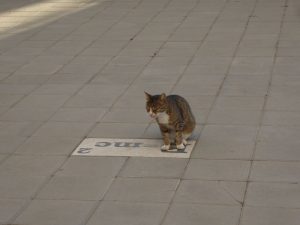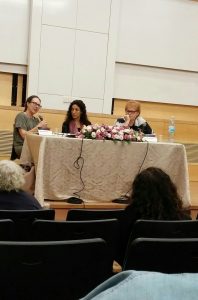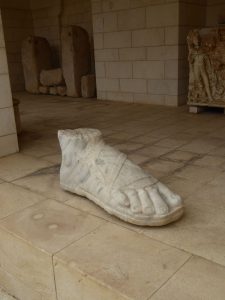
It may very well be that “all the world’s a stage” but somehow it seems to me that the stage is actually a classroom. Not only does life give me “private lessons” on a daily basis (with no “opt out” option… ) everything I learn seems to connect to being a teacher and to my own classroom.
The latest case in point is a lecture I recently attended, supposedly having nothing to do with the classroom. As you may have noticed, I’ve become fascinated by genealogy research since I received those letters from pre-war Poland and began my “Who Were You, Dora?” series of posts. It was a panel on historical writing from different perspectives with the famous historian Deborah Lipstadt and the historical-novelist Rachel Kadish, moderated by Ilana Blumberg. It was fascinating and I enjoyed hearing both speakers. I would happily attend a much longer lecture given by each of them!!

Frankly, I hadn’t heard of Rachel Kadish before the talk. I made the effort to go to the lecture after a long day at school, just before national matriculation exams, because I had wanted to hear Professor Lipstadt speak – it was worth it! However, it was actually some of Kadish’s words that have been “dancing” in my head all week.
First of all, Rachel Kadish referred to a quote which I later found online, attributed to E.M. Forster “How do I know what I think until I see what I say?”
Isn’t that a great answer to the perennial question – “why do I blog?!

Naomi’s Photos
I often write comments on education-related blog posts that I read. Only through writing can I clearly work out what is it exactly I agree or disagree with, or which elements will be useful for me in class. That’s why I also reflect, in writing, on handbooks for teachers in my blogging challenges. Finding the right words, or “weighing my words” helps me define my thoughts.
I was so surprised to learn, following the lecture, that Rachel Kadish had a speech impediment when she was a child. It certainly isn’t noticeable today. In an article by Kadish in the New York Times called “Weighing my Words” she explains what words meant to her as a child and ponders the connection between those experiences and her becoming a writer.
As an EFL teacher of Special Ed., examples of real people who manage to turn a problem, which made them miserable as children, into an advantage later on in life are important. It’s particularly helpful to encounter such examples in contexts that are not given in some teachers’ in-service training course.

We teachers need to transfer a great deal of “positive energy” to the students, particularly those who are having a rough time of it. That means our “inspiration banks” must be filled often, from a variety of sources.
Oh!
And what about the book “The Weight of Ink” by Rachel Kadish?
I haven’t read it yet. Planning to get it as an audio-book for my birthday. So a review of that will come later on.
I am awestruck that you made the time to go to a lecture last week! Chapeau!
I surprised myself, too, Francine!